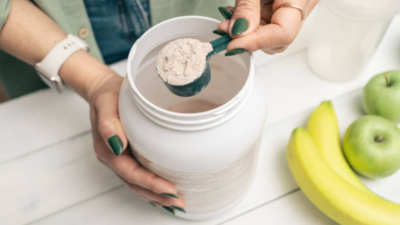Protein powders and liver health: Should you really be scooping daily? |

As a practicing specialist of liver diseases and nutrition over the last decade, this is a very often asked question. Hey doctor can I consume a protein supplement?To understand the answer, it is imperative for us to know the importance of protein in our diet and recommendations on how much we need to consume it. Protein plays several vital roles in the body. Protein is made up of amino acids and when you consume protein, your digestive system would break down protein into amino acids which are pivotal for making many important biomolecules in the body. Few important roles of these amino acids are:
- Immune system- Antibodies needed to fight infection are made from amino acids
- Growth- Body tends to utilize protein to grow
- Hormones- several hormones like insulin and growth hormone are made from protein
- Muscle health and bodily functions- Amino acids are important for muscle growth and function. Enzymes are molecules that mediate specialized chemical reactions in the body are also made up of protein.
- Protein also helps in maintaining the acid base balance of the body
How much protein do we need?
Most individuals do not know the amount protein they need to consume to maintain all the above-mentioned functions. An average adult Indian typically needs around 0.8 to 1 gram of protein per kilogram of body weight per day. This translates to approximately 56 to 70 grams of protein per day for a person weighing 70 kg. For an adult man, the recommendation is around 56 grams per day, while for an adult woman, it is about 46 grams. If you are moderately active, aim for 1.3g per kilogram. The recommendation for those who perform intense physical activity is 1.6 grams per kilogram.
Now coming to the most important question. Are protein powders safe?
If someone is consuming protein as a supplement to meet the above-mentioned protein requirement of the body, it is generally considered safe. However, the most important concerns around protein powders are:
- Some protein powders have little added sugar, and others have a lot of it (as much as 20 to 23 grams per scoop). This extra load of calories can lead to weight gain and a myriad of bad consequences.
- Artificial sweeteners, preservatives, and flavouring agents reduce the health benefits of protein powders and can potentially lead to long term health consequences.
- Many poorly made protein powders may contain traces of heavy metals (lead, arsenic, cadmium, and mercury), bisphenol-A, pesticides, or other contaminants which are deleterious to the body
- Pre-existent health condition- Several individuals might have a pre-existing health ailment which might affect their
kidney health . In a scenario like that, consumption of protein (especially excessive amounts) can lead to excessive strain on the kidneys. The kidneys are responsible for filtering out waste products from the body, including products of protein metabolism like urea. Inappropriately high consumption of protein on the background of such known or un-known pre-existent kidney issue can lead to worsening kidney dysfunction. If adequate water intake is not maintained, excessive protein intake may lead to dehydration. - Certain protein supplements particularly those with whey or casein can lead to digestive issues in people with
lactose intolerance . Plant-based protein, sourced from various plants like soy, rice, or peas, is suitable for vegans and those with lactose intolerance.
After understanding all these concerns, what do we experts recommend?
The most important way to consume protein is from your diet. Whole food sources of protein, such as lentils, seeds, nuts, cottage cheese (paneer), soya, tofu, dairy products, chick peas, peanuts, broccoli, almonds, eggs, poultry, fish are various examples of food articles which provide not only protein but also other essential vitamins, minerals and fibre which are important of overall health.Even if a person intends to consume a protein supplement, it is recommended that one understands their protein requirement (so that excessive consumption is avoided), underlying issues like lactose intolerance and any other health conditions which could potentially lead to underlying undiagnosed kidney dysfunction which could worsen on consuming high protein drinks. Reading the labels is extremely pivotal to avoid supplements with any extra sugar, artificial sweeteners, flavouring agents, and other preservatives, thickening and anti-caking agents which can deplete the health benefits of protein.Age related muscle loss called sarcopenia is a natural part of aging and after 30, one can begin to lose as much as 3 to 5 % per decade. Hence maintaining an active lifestyle, consumption of adequate weight-based protein with incorporation of resistance training is vital to prevent sarcopenia. Try to maintain protein intake from your diet, however if you feel a supplement is must, please consult your health care expert who can look into your protein requirement and underling health ailment (if any) and recommend you an apt protein supplement. Dr. Sandeep Satsangi, Senior Consultant – Hepatologist & Liver Transplant Physician, Apollo Hospitals Bannerghatta Road, Bengaluru



